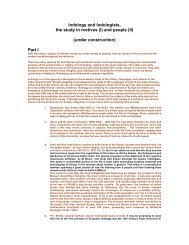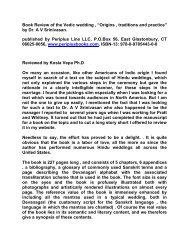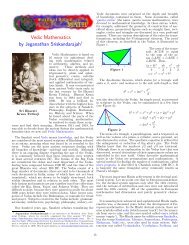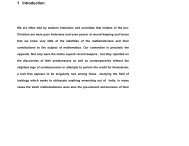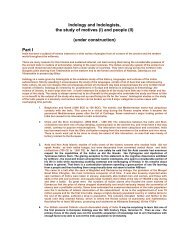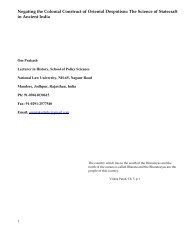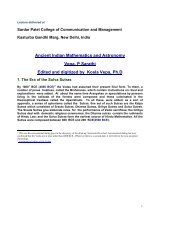The Dhaarmik Traditions - Indic Studies Foundation
The Dhaarmik Traditions - Indic Studies Foundation
The Dhaarmik Traditions - Indic Studies Foundation
Create successful ePaper yourself
Turn your PDF publications into a flip-book with our unique Google optimized e-Paper software.
2.5 Paths to Self Realization<br />
<strong>The</strong>re are many paths to Self realization, but many of these paths can be categorized<br />
into four main Yogas or means to attain the goal. <strong>The</strong>y are<br />
Karma<br />
Yoga<br />
Bhakti<br />
Yoga<br />
Jnana<br />
Yoga<br />
Raja Yoga<br />
Work and Action, subject of Chapter 3 of the Bhagavad Gita<br />
Yoga of Devotion, Chapter 12 of Bhagavad Gita<br />
Yoga of Knowledge, yoga of pure discrimination, Chapter 4 of<br />
Bhagavad Gita, summarized in Chapter 2<br />
Yoga of meditation, summarized in Chapter 6 of Bhagavad<br />
Gita<br />
For most individuals a balanced combination of all four Yogas is most appropriate, the<br />
proper balance depending on the individual’s vasanas or svabhava and the stage of<br />
his journey through life. <strong>The</strong>re is no intent to convey that any particular Yoga is<br />
superior to the other.<br />
For an introduction to Patanjali’s Yoga Sutras see for instance “Practical Yoga ,<br />
ancient and modern” by Earnest E Wood or Raja Yoga by Swami Vivekananda<br />
Yoga is the control of ideas in the Mind. Yoga means the establishment of perfect<br />
harmony between the everyday self and its spiritual source.<br />
Five Kinds of ideas or modifications (Patanjali’s Yoga Sutras)<br />
Right Knowledge<br />
Wrong Knowledge or indiscrimination<br />
Fancy or verbal delusion<br />
Sleep<br />
Memory<br />
67



